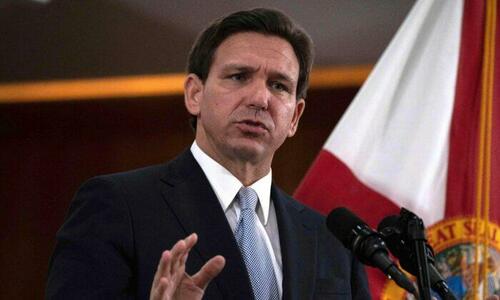
Authored by Linda Chavez via RealClear Wire,
Ron DeSantis seems to believe that his best chance of becoming the GOP presidential nominee is to be more extreme than the guy he needs to defeat, Donald Trump. And what better issue to flex his MAGA bona fides than immigration?
Florida’s draconian new immigration restrictions, signed into law by DeSantis two months ago, are now taking effect. They will have a devastating impact on at least two of the state’s major industries: agriculture and construction.
The new law imposes tough penalties on both undocumented employees and the employers who hire them. A job applicant who presents a false Social Security number or other documentation during the hiring process will be subject to a third-degree felony and could serve five years in jail. The statute also requires employers with more than 25 workers to use the federal E-Verify system, which has a documented history of both rejecting legitimate workers and clearing those who aren’t authorized. If employers hire unauthorized workers, they could end up losing their business licenses.
Workers are apparently fleeing the state in response – and not just those who are in the country illegally. Many immigrant families have mixed status: an undocumented parent or spouse and legal immigrants or U.S. citizens in the same household. One 2017 study estimated that more than 900,000 Floridians lived in mixed-status households, and when a family member faces the risk of becoming a felon, they may decide that staying in Florida isn’t worth the risk.
The Wall Street Journal recently reported that in Miami’s booming construction industry, between 25% and 50% of local construction workers have already disappeared from job sites. The owner of a large farming and packaging company told the WSJ that he’d lost half of his employees because of the law.
Construction and agriculture depend heavily on unauthorized workers nationally and in Florida. A recent Kaiser Family Foundation analysis estimates that almost 40% of agricultural workers in the state are noncitizen immigrants (most of whom are also undocumented), as are 23% percent of its construction workers. These employees are not easily replaceable – and certainly not with American workers. Florida’s economy will take a dramatic hit because of DeSantis’ efforts to woo the MAGA base with anti-immigrant measures.
Yet DeSantis has been touting Florida’s economy as a reason Republican voters should support him. And it’s true that Florida is first in a recent ranking that measures which states were most successful in attracting talent. The governor noted in a press release about the rankings, “Florida is leading the nation in net migration and talent attraction. As other states continue to struggle at the hands of poor leadership, people and businesses are flocking to Florida.”
The governor’s statement also boasts about the 388,000 new residents added to the state between 2016-2020. What he doesn’t say is how many of those new residents were immigrants, legal and illegal. A whopping 21% of Florida’s population is foreign-born, including about 775,000 who are undocumented. Immigrants are well represented across various occupations in the state, including 32% of service occupations and 23% of management, business, and science occupations. But the state’s tough new law may end up making Florida a much less attractive state in which to work or establish a business – certainly in industries that rely on immigrant workers.
What is ironic about DeSantis’ move is that Florida’s illegal immigration problem has improved over the years, despite influxes of newcomers from Venezuela and elsewhere in Latin America. According to the Pew Research Center, which provides one of the best historical analyses of immigration trends available, there were more than 1 million undocumented people living in Florida in 2007.
DeSantis is struggling to gain support, which won’t happen if he keeps being a poor imitation of the other prominent Florida-based candidate running for president. DeSantis should be trying to convince voters that he’s been a job creator in Florida and he will do the same for the country.
Making it more difficult to hire people to do essential jobs tarnishes his credentials. He ought to be telling Republicans that we need to make it easier for people whose skills we need to come to the United States legally, and that he’ll push for necessary reform of our immigration laws when he becomes president. He understands that workforce growth means more for everyone, not just individual workers and their families but the communities in which they live and spend their money. DeSantis says the 2024 election is about the future – and he’s right. But the future is not about building walls or driving workers away but welcoming them. It’s not about protecting jobs but creating them.
Linda Chavez served in the Reagan White House and writes frequently on race, ethnicity and immigration.
Authored by Linda Chavez via RealClear Wire,
Ron DeSantis seems to believe that his best chance of becoming the GOP presidential nominee is to be more extreme than the guy he needs to defeat, Donald Trump. And what better issue to flex his MAGA bona fides than immigration?
Florida’s draconian new immigration restrictions, signed into law by DeSantis two months ago, are now taking effect. They will have a devastating impact on at least two of the state’s major industries: agriculture and construction.
The new law imposes tough penalties on both undocumented employees and the employers who hire them. A job applicant who presents a false Social Security number or other documentation during the hiring process will be subject to a third-degree felony and could serve five years in jail. The statute also requires employers with more than 25 workers to use the federal E-Verify system, which has a documented history of both rejecting legitimate workers and clearing those who aren’t authorized. If employers hire unauthorized workers, they could end up losing their business licenses.
Workers are apparently fleeing the state in response – and not just those who are in the country illegally. Many immigrant families have mixed status: an undocumented parent or spouse and legal immigrants or U.S. citizens in the same household. One 2017 study estimated that more than 900,000 Floridians lived in mixed-status households, and when a family member faces the risk of becoming a felon, they may decide that staying in Florida isn’t worth the risk.
The Wall Street Journal recently reported that in Miami’s booming construction industry, between 25% and 50% of local construction workers have already disappeared from job sites. The owner of a large farming and packaging company told the WSJ that he’d lost half of his employees because of the law.
Construction and agriculture depend heavily on unauthorized workers nationally and in Florida. A recent Kaiser Family Foundation analysis estimates that almost 40% of agricultural workers in the state are noncitizen immigrants (most of whom are also undocumented), as are 23% percent of its construction workers. These employees are not easily replaceable – and certainly not with American workers. Florida’s economy will take a dramatic hit because of DeSantis’ efforts to woo the MAGA base with anti-immigrant measures.
Yet DeSantis has been touting Florida’s economy as a reason Republican voters should support him. And it’s true that Florida is first in a recent ranking that measures which states were most successful in attracting talent. The governor noted in a press release about the rankings, “Florida is leading the nation in net migration and talent attraction. As other states continue to struggle at the hands of poor leadership, people and businesses are flocking to Florida.”
The governor’s statement also boasts about the 388,000 new residents added to the state between 2016-2020. What he doesn’t say is how many of those new residents were immigrants, legal and illegal. A whopping 21% of Florida’s population is foreign-born, including about 775,000 who are undocumented. Immigrants are well represented across various occupations in the state, including 32% of service occupations and 23% of management, business, and science occupations. But the state’s tough new law may end up making Florida a much less attractive state in which to work or establish a business – certainly in industries that rely on immigrant workers.
What is ironic about DeSantis’ move is that Florida’s illegal immigration problem has improved over the years, despite influxes of newcomers from Venezuela and elsewhere in Latin America. According to the Pew Research Center, which provides one of the best historical analyses of immigration trends available, there were more than 1 million undocumented people living in Florida in 2007.
DeSantis is struggling to gain support, which won’t happen if he keeps being a poor imitation of the other prominent Florida-based candidate running for president. DeSantis should be trying to convince voters that he’s been a job creator in Florida and he will do the same for the country.
Making it more difficult to hire people to do essential jobs tarnishes his credentials. He ought to be telling Republicans that we need to make it easier for people whose skills we need to come to the United States legally, and that he’ll push for necessary reform of our immigration laws when he becomes president. He understands that workforce growth means more for everyone, not just individual workers and their families but the communities in which they live and spend their money. DeSantis says the 2024 election is about the future – and he’s right. But the future is not about building walls or driving workers away but welcoming them. It’s not about protecting jobs but creating them.
Linda Chavez served in the Reagan White House and writes frequently on race, ethnicity and immigration.
Loading…





